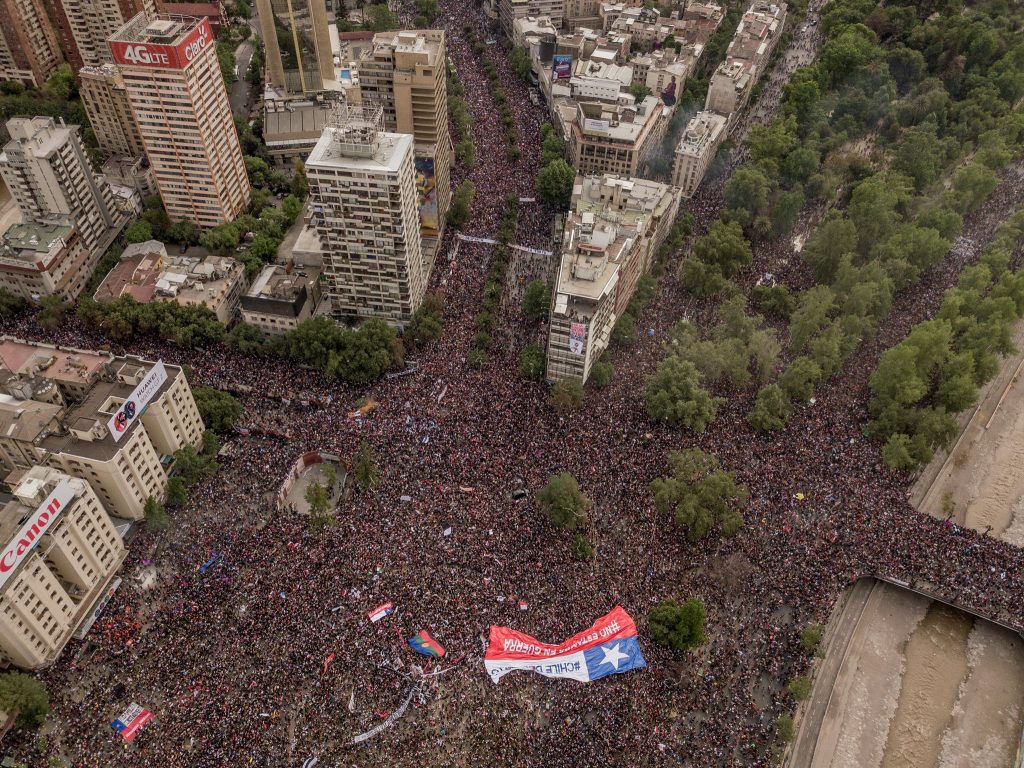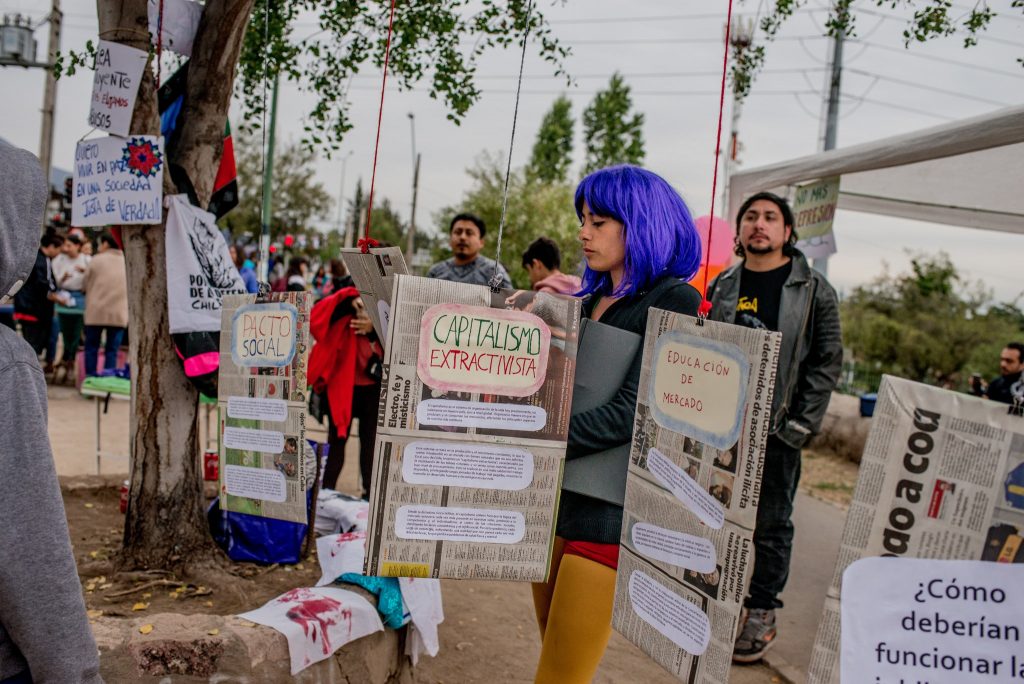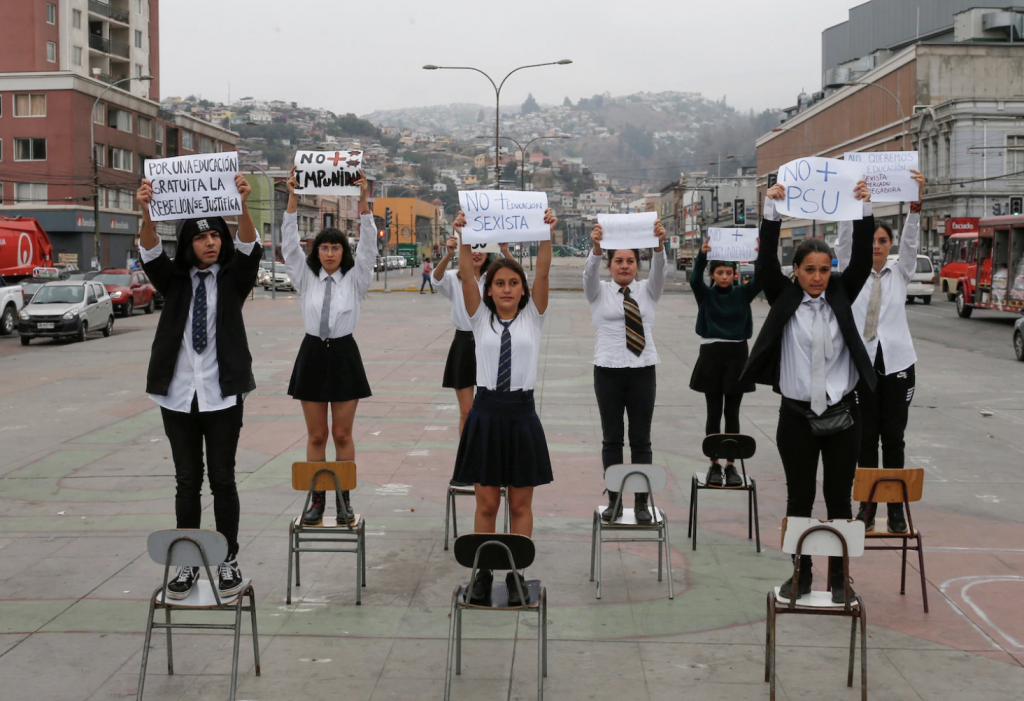On October 18, 2019, massive protests broke out across Chile and people took to the streets to have their voices heard against inequality. Although Chile is cited as one of the fastest-growing economies in Latin America, it is also cited as having one of the highest rates of income inequality in the region. The protests began with students-led protests within metro stations when metro fares increased. However, the protests soon expanded when more people became involved and as the slogan signifies, “It’s not 30 pesos, it’s 30 years,” people began protesting all that had happened in 30 years since the transition to democracy, leading to the current state of high inequality. People protested all aspects of Chilean life, society, politics, and economy. Just a sample of these issues includes high prices, low wages, the privatized pension system, privatized healthcare, the education system, and the current constitution. The protestors demanded serious structural reforms to many present-day policies and institutions dating back to the dictatorship.

https://www.nytimes.com/2019/11/03/world/americas/chile-protests.html
The authoritarian dictatorship, led by General Augusto Pinochet, ruled Chile for 17 years. The dictatorship committed numerous crimes against humanity in which at least 3,200 people died or disappeared and 40,000 were imprisoned or tortured according to the official truth commissions, but these estimates may be higher. Additionally, approximately 200,000 people went into exile. In 1988, a plebiscite took place in which people voted to end the dictatorship and the country transitioned to democracy in 1990. However, it was a pacted transition with a lack of universal condemnation, Pinochet allies remaining in political power, and the continuation of neoliberalist economic policies implemented by the dictatorship.

https://www.nytimes.com/2019/11/03/world/americas/chile-protests.html
Numerous media outlets began reporting the protests as soon as they broke out. Prominent media coverage by The New York Times, The Washington Post, and The Guardian is sympathetic to the protestors, sharing their struggles with a greater audience. One such is a video published by The Guardian on November 5th that summarizes the protests. The video shows footage from the protests, some of which is violent. As the protests escalated, the government declared a state of emergency and sent out military forces and tanks to combat the protestors. The military used water cannons, tear gas, and rubber pellets on the protestors while the protestors threw rocks, bricks, and petrol bombs. The burning of buses, metro stations, and looting of supermarkets also took place.
The video highlights the protestors’ frustrations. One protestor from the video says, “We are protesting against problems in the whole system in general. Above all, the neo-liberal system in Chile.” The video also calls attention to the protestors’ demands for justice regarding deaths and human rights violations from the protests. Numerous people accuse the government of human rights violations and police violence. Approximately 2,000 people were detained, over 30 people have died, and thousands wounded.

https://www.washingtonpost.com/world/the_americas/chile-is-preparing-to-rewrite-its-constitution-why-are-people-still-protesting/2020/02/01/eb7ee6b2-43cc-11ea-99c7-1dfd4241a2fe_story.html
The protests reveal how Chileans are questioning the legitimacy of their government, with some protestors calling for the removal of the right-wing President Sebastián Piñera. As the video shows, President Piñera initially responded to the protests by stating, “We are at a war against a very powerful enemy who does not respect anyone or anything.” He was received with massive criticism due to these insensitive remarks. Eventually concessions were made, and the President asked his cabinet to resign, suspended the increased metro fares, promised to raise pensions, and began plans on a plebiscite to vote on a new constitution in April which has been moved to October due to the COVID-19 pandemic. As the COVID-19 pandemic puts a pause on mass-in-person protests, protestors continue to further their cause online and on social media. Currently, most of the coverage is by journalists and the media. As time passes, it will be interesting to see what the outcome is and further, how scholars will frame and remember these protests in the larger history of Chile.
Works Cited:
Adelman, Jeremy, and Pablo Pryluka. “The Politics of Frustration in Latin America.” Project Syndicate, October 29, 2019. https://www.project-syndicate.org/commentary/why-latin-america-is-protesting-by-jeremy-adelman-and-pablo-pryluka-2019-10.
Associated Press. “In Chile, Unresolved Economic Problems May Lead to New Protests.” NBC News, March 11, 2020. https://www.nbcnews.com/news/latino/chileans-worry-unresolved-problems-may-lead-new-protests-n1155701.
Bunyan, Rachel. “18 Killed As Thousands of Protestors Take to the Streets in Chile. Here’s What to Know.” Time, October 25, 2019. https://time.com/5710268/chile-protests/.
Collins, Cath, Katherine Hite, and Alfredo Joignant Rondón, eds. The Politics of Memory in Chile: From Pinochet to Bachelet. Boulder, Colorado: FirstForumPress, 2013.
Hutchison, Elizabeth Q., Thomas Miller Klubock, Nara B. Milanich, and Peter Winn, eds. The Chile Reader: History, Culture, Politics. Latin America Readers. Durham: Duke University Press, 2014.
Kowalczyk, Anna. “Where the Ongoing Mass Protests Against Neoliberalism in Chile Came From.” In These Times, February 19, 2020. https://inthesetimes.com/article/22320/mass-protests-neoliberalism-chile.
Krygier, Rachelle. “Chile Is Preparing to Rewrite Its Constitution. Why Are People Still Protesting?” Washington Post, February 1, 2020. https://www.washingtonpost.com/world/the_americas/chile-is-preparing-to-rewrite-its-constitution-why-are-people-still-protesting/2020/02/01/eb7ee6b2-43cc-11ea-99c7-1dfd4241a2fe_story.html.
McGowan, Charis. “How Quarantined Chileans Are Keeping Their Protest Movement Alive.” Aljazeera, April 14, 2020. https://www.aljazeera.com/indepth/features/quarantined-chileans-keeping-protest-movement-alive-200414122141809.html.
Munita, Tomas. “‘Chile Woke Up’: Dictatorship’s Legacy of Inequality Triggers Mass Protests.” The New York Times, November 3, 2019, sec. World. https://www.nytimes.com/2019/11/03/world/americas/chile-protests.html.
Taub, Amanda, and Tomas Munita. “‘Chile despertó’: el legado de desigualdad desata protestas masivas.” The New York Times, November 4, 2019, sec. en Español. https://www.nytimes.com/es/2019/11/04/espanol/america-latina/protestas-sebastian-pinera.html.
Tens of Thousands Protest in Chile: “We’ve Reached a Crisis,” 2019. https://www.youtube.com/watch?v=VMYM00i6_L8.
“Violence Resurges in Protest-Racked Chile, Nearly 300 Arrested.” Reuters, March 3, 2020. https://www.reuters.com/article/us-chile-protests-idUSKBN20Q1QD.
By Emily Beuter
